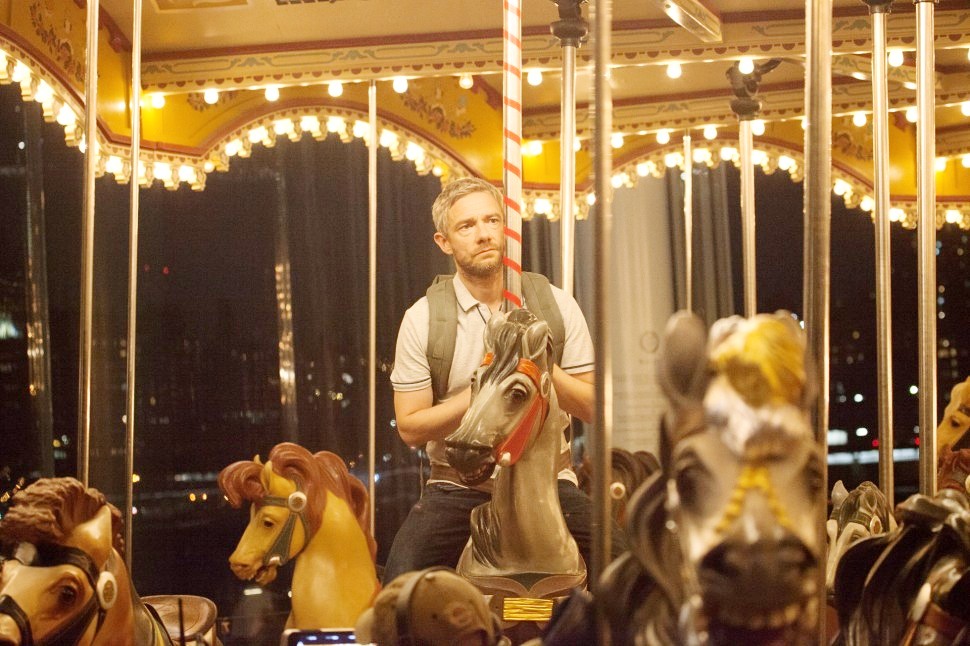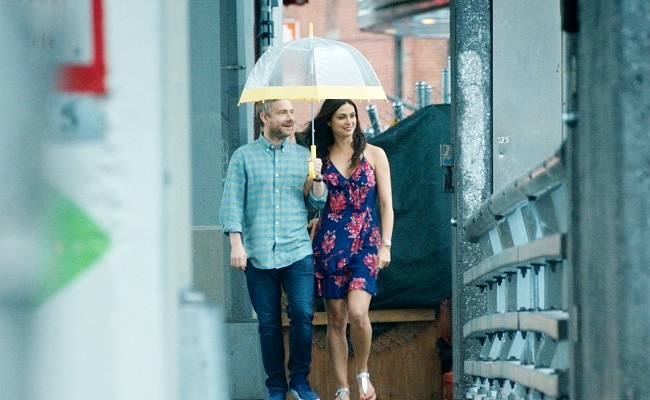
Martin Freeman likes to mix things up.
The last time I chatted with the actor — best known for his roles in The Hobbit Trilogy, BBC’s Sherlock, and more recently, Ryan Coogler’s Black Panther – he was roughing it in the Australian bush, filming an apocalyptic zombie flick and carrying a baby on his back through the desert. For his latest movie, Ode To Joy, another indie, though this time a rom-com, Freeman’s still happily suffering for his art – he plays a cynical New York librarian named Charlie who suffers from cataplexy, a condition that causes him to lose consciousness whenever he experiences heightened emotions, like joy.
Charlie’s illness is played for laughs for most of the film, which means Freeman had to get comfortable with fainting on screen … a lot. But the quirky romantic comedy has plenty of heart and a deeper message, one Freeman found relatable which is why he stuck with this thing for so many years.
Uproxx chatted with the actor about his love for New York, breakfast burritos, and when he thinks the MCU will want him back.
You’ve said you’re picky when it comes to scripts. What about this movie interested you?
I first read it some years ago. I’d been attached to it in one form or another for a good couple of years, but the idea of a person who has to avoid heightened emotions, whatever they are, in order to stop knocking himself out on the pavement, I just thought it was funny and horrendous at the same time.
You’ve worked on blockbusters like The Hobbit Trilogy and indies like this film. Does the cast bond quicker when the scale is smaller?
It is a bit more mucking in, I suppose. But I think regardless of the size of it, in my experience, actors just want to shoot the breeze anyway. If you put a bunch of actors together, you put us on our little chairs whether it’s in the bush, or in Brooklyn, or on the stage in London, people do just want to talk. I think regardless of the size of budget, you do end up bonding quite quickly.
But I’m assuming the catering is better when the budget is bigger?
Yeah, although I was getting some pretty good breakfast sandwiches in New York. We don’t really do those here, you know?
What, like bagels?
No, no, not bagels. What do you call them? Not tacos, but …
Oh, breakfast burritos?
A breakfast burrito, yeah. That’s not really a thing in London. America being the land of the free and the land of opportunity and the breakfast burrito, you don’t need a massive budget to get those. And I’m happy with a bit of scrambled egg and avocado and a bit of flour, I’m fine with that.
So that’s what sold you?
That was the clincher.
Charlie’s a naturally cynical person – he has to be to survive – but this is a rom-com so he needs to be likable too. How did you achieve that balance?
I suppose, for me, I don’t really see a contradiction in those things, because I think being a bit cynical and jaded is interesting in people. That means you have some experience, that means you learned from that experience. You might not have learned to take the most positive thing from it, but you’ve got your ass kicked a little bit by life, which is interesting. I like cynical people. I’m English, of course, it comes easier to us. I just think as long as you are still a fairly decent person, and Charlie is a decent person. He sees life in a quite parabolic funny way, and he’s trying.

Charlie is an extreme case, but there’s something about his belief that he can’t be happy that feels relatable.
Yeah, I thought it was funny, but I thought it had some truths in it about love and about how we see ourselves, and the stories we tell ourselves about ourselves. ‘I can’t do that, so I’m not going to do that.’ And before you know it, you’ve boxed yourself in. And I think that’s pretty relatable to everybody.
The major problem I had with this film is the idea that anyone could find joy during a New York City commute. I think my fellow New Yorkers would have a real problem with that premise.
[Laughs] I guess those were pointed out for comic effect. I suppose it was the absurdity of as soon as there’s something you can’t see, you see it everywhere. You know? As soon as you split up with somebody, you turn around and there are people hugging and kissing all over the street. You just see love everywhere, you know? So, I guess that’s more the thing for Charlie. It’s always being reminded of stuff that he won’t be able to join in.
But an outsider, as someone who loves New York, [I thought] ‘Well, fuck it. I’d like to believe that.’ New York’s pretty cool. I’m in London. I do feel that about London. Even though London is full of dirt and grime, I love every inch of it, you know?
You’d just think that if someone has a condition where they need to avoid feeling joy, the New York subway system would be the perfect way to do that.
No, that’s very true, and I definitely found out when I was living in Brooklyn, trying to get a train into Manhattan. It’s a surprise because I think we always assume there are some things that Americans are just going to have much more efficient than us. And I think we assume that about the underground system, and yeah, I was wrong — really, really wrong.
Where are we with a Black Panther sequel? Have you heard anything about when filming might start?
The last I heard, we won’t be doing it next year. So, it might be 2021 when we’re making the next Black Panther. That’s all I know.
Did Everett Ross survive the snap?
I think so, yeah. No, no one’s told me that he died.
That’s always a good sign you still have a job.
Yeah, I think I got a gig.
‘Ode to Joy’ is currently playing in theaters.






